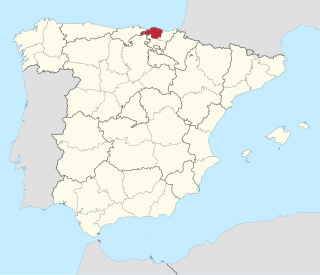Related Research Articles

Álava or Araba, officially Araba/Álava, is a province of Spain and a historical territory of the Basque Country, heir of the ancient Lordship of Álava, former medieval Catholic bishopric and now Latin titular see.

Biscay is a province of Spain and a historical territory of the Basque Country, heir of the ancient Lordship of Biscay, lying on the south shore of the eponymous bay. The capital and largest city is Bilbao.

A province in Spain is a territorial division defined as a collection of municipalities, although their origin dates back to 1833 with a similar predecessor from 1822. In addition to their political function, provinces are commonly used today as geographical references for example to disambiguate small towns whose names occur frequently throughout Spain. There are many other groupings of municipalities as described in Local government in Spain.

Gipuzkoa is a province of Spain and a historical territory of the autonomous community of the Basque Country. Its capital city is Donostia-San Sebastián. Gipuzkoa shares borders with the French department of Pyrénées-Atlantiques at the northeast, with the province and autonomous community of Navarre at east, Biscay at west, Álava at southwest and the Bay of Biscay to its north. It is located at the easternmost extreme of the Cantabric Sea, in the Bay of Biscay. It has 66 kilometres of coast land.

Karrantza Harana/Valle de Carranza, is a town and municipality located in the province of Biscay, in the Basque Country. It is located in the comarca of Enkarterri and it is the westernmost and largest municipality of the province.

Portugalete is a town lying to the west of Bilbao in the province of Biscay in the Autonomous Community of Basque Country, northern Spain.
Arrieta is a town and municipality located in the province of Biscay, in the Basque Country, Spain. Arrieta is part of the comarca of Mungialdea. It had a population of 552 inhabitants as of 2007, and a population of 564 inhabitants as of 2017.

Elorrio is a town and a municipality located in the eastern part of the province of Biscay, in the Basque Country, in northern Spain. As of 2017, it has a population of 7,307 inhabitants. It covers an area of 37.20 square kilometers and it has a population density of 193.58 people per square kilometer. It holds the medieval title of Most Loyal and Noble Villa.

Iruña de Oca is a municipality located in the province of Álava, in the Basque Country, northern Spain. Iruña de Oca is the most populated municipality of the Cuadrilla de Añana, one of the seven comarcas of the province, more than 35% of the people of Añana live there.

Laudio/Llodio is a town and municipality located in the province of Álava, in the Basque Country, northern Spain. Laudio is the name in Basque language and Llodio in Spanish; both are used indistinctly.

Orcoyen is a town and municipality located in the province and autonomous community of Navarre, northern Spain, being part of Pamplona's metropolitan area. Its population currently stands at 3,637 inhabitants. Its population density is of 0.69 inhabitants/km2. This area is home to one of Spain's most industrious regions, which is Pamplona's metropolitan area; this has triggered a transition from an agricultural background, giving way to the automotive industry.

The Basque Parliament is the legislative body of the Basque Autonomous Community of Spain and the elected assembly to which the Basque Government is responsible.

The municipality is the basic local administrative division in Spain together with the province.

The 2007 Spanish local elections were held on Sunday, 27 May 2007, to elect all 66,131 councillors in the 8,111 municipalities of Spain and all 1,038 seats in 38 provincial deputations. The elections were held simultaneously with regional elections in thirteen autonomous communities, as well as local elections in the three foral deputations of the Basque Country and the eleven island councils in the Balearic and Canary Islands.

Condado de Treviño is a municipality in the province of Burgos, autonomous community of Castile and León, Spain. This municipality and the geographically smaller La Puebla de Arganzón make up the enclave of Treviño. Although the enclave is part of Burgos it is surrounded by the province of Álava, part of the autonomous community of the Basque Country.

The political division of the Kingdom of Spain is defined in Part VIII of the Spanish constitution of 1978, which establishes three levels of territorial organization: municipalities, provinces and autonomous communities, the first group constituting the subdivisions of the second, and the second group constituting the subdivisions of the last. The State guarantees the realization of the principle of solidarity by endeavouring to establish an economic balance between the different areas of the Spanish territory.

The autonomous Community of the Basque Country within Spain contains several comarcas or eskualdeak in the Basque language, referring to local districts, grouped into its three long-established provinces.

The 2019 Spanish local elections were held on Sunday, 26 May 2019, to elect all 66,979 councillors in the municipalities of Spain and all 1,038 seats in 38 provincial deputations. The elections were held simultaneously with regional elections in twelve autonomous communities, as well as local elections in the three foral deputations of the Basque Country, the eleven island councils in the Balearic and Canary Islands and the 2019 European Parliament election.

The 2023 Spanish local elections will be held on Sunday, 28 May 2023, to elect all councillors in the municipalities of Spain and all 1,038 seats in 38 provincial deputations. The elections will be held simultaneously with regional elections in at least seven autonomous communities, as well as local elections in the three foral deputations of the Basque Country, the eleven island councils in the Balearic and Canary Islands.
References
- ↑ "Basque Country (Spain): Provinces & Municipalities - Population Statistics, Charts and Map". www.citypopulation.de. Retrieved 2019-04-28.